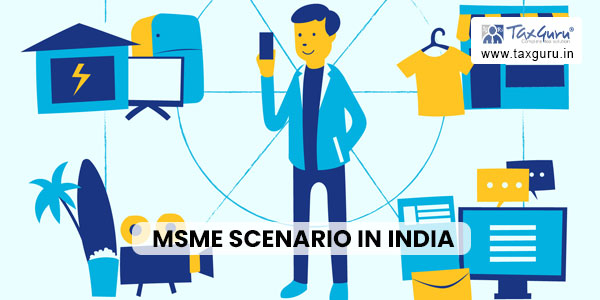Explore the MSME scenario in India with insights on employment, exports, and financing trends. Learn about the digitization impact, cross-border financing, and ECGC services for exporters. Gain valuable insights into the evolving MSME landscape.
A note on MSME scenario in India
- MSMEs provide employment to 120 million persons;
- MSMEs account for 42% of India’s exports;
- Private banks lend bulk of the finance to MSMEs whereas PSU banks’ contribution is only 4% of total lending to MSMEs;
- About 30% of MSMEs went out of business during COVID times;
- Finance (by means of Bill discounting) offered to MSMEs @ rates between 7 to 11% during last three years was as follows:
2020-21 Rs.18,000 crs
2021-22 Rs.40,000 crs
2022-23 Rs.82,000 crs (Estimated)

- World is looking at India’s MSME model.
Financial institutions till now, were perusing the Balance Sheet of clients before deciding on the quantum of finance to borrowers. To ensure that they will get the finance sought, borrowers often resorted to ‘cosmetic’ treatment of Balance Sheets before submitting to financial institutions. So, MSMEs are cautioned, now that everything is digitized, financial institutions now no more peruse the financial papers, as they have access to GST data that gives a clear picture of borrower’s capabilities.
Some times banks in India do not recognize letters of credit from Africa. To offset this situation, in near future an exporter in India will have access to cross-border financing, i.e. he has recourse to international platforms.
As regards financing MSMEs against purchase orders, there are circumstances when the supplier is unable to procure raw materials to supply against purchase order. In such cases, the supplier is treated as a buyer by the lending bank so that he can be financed to purchase raw materials.
ECGC (Export Credit Guarantee Corporation of India) services to exporters.
ECGC offers its services to exporters. It is incorporated under the Companies Act and fully owned by the Central Govt. It is regulated by IRDA (Insurance Regulatory & Development Authority) whose approval is needed whenever ECGC revises its charges/premiums. Its services come into picture when the credit worthiness of the importer is not known and agreed payment terms are anything other than L/C, DA, DP, etc. In case of default from the importers, it is said that ECGC pays 80 to 90% of invoice value to the exporter.
ECGC also helps exporter in getting a report on an importer. Obtaining such a report on an importer in a foreign country costs anywhere between Rs.10,000 to 15,000 to ECGC, but it is known that they charge much less, say as low as Rs.500 to Rs.1000 to the concerned exporter in India.
When an importer defaults to make payment to an Indian exporter, the local person/entity at the importing country assists in getting payment from the importer on a commission which may be anywhere between 15 to 20% of the invoice value.
Author: Guruprakash N. Bhambore, Secretary, The Bombay Commodity Association Ltd






Chapter V of The MSMED Act, 2006 has been diluted by States’ MSEFCs by ignoring its Section 18(5) providing for 90 days limit for completion of Arbitration process after failure of Conciliation between suffering Seller MSE and defaulting Buyer.. Any discussion ?